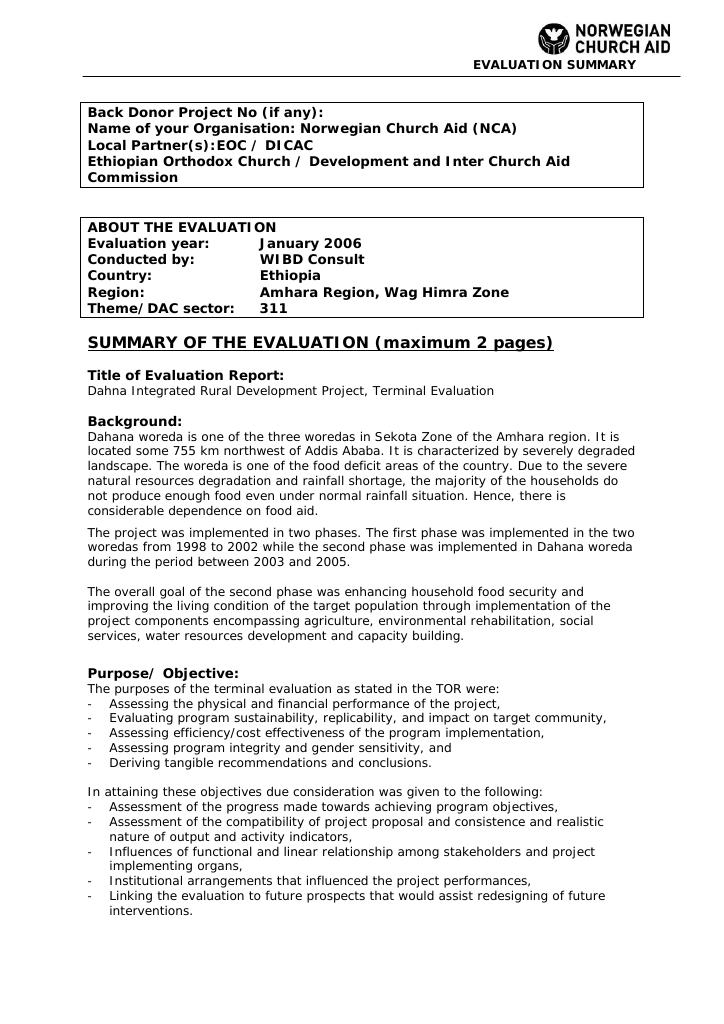Evaluering
Dahna Integrated Rural Development Project, Terminal Evaluation
Background Dahana woreda is one of the three woredas in Sekota Zone of the Amhara region. It is located some 755 km northwest of Addis Ababa. It is characterized by severely degraded landscape. The woreda is one of the food deficit areas of the country. Due to the severe natural resources degradation and rainfall shortage, the majority of the households do not produce enough food even under normal rainfall situation. Hence, there is considerable dependence on food aid.The project was implemented in two phases. The first phase was implemented in the two woredas from 1998 to 2002 while the second phase was implemented in Dahana woreda during the period between 2003 and 2005.The overall goal of the second phase was enhancing household food security and improving the living condition of the target population through implementation of the project components encompassing agriculture, environmental rehabilitation, social services, water resources development and capacity building. Purpose/objective The purposes of the terminal evaluation as stated in the TOR were:- Assessing the physical and financial performance of the project,- Evaluating program sustainability, replicability, and impact on target community,- Assessing efficiency/cost effectiveness of the program implementation,- Assessing program integrity and gender sensitivity, and- Deriving tangible recommendations and conclusions.In attaining these objectives due consideration was given to the following:- Assessment of the progress made towards achieving program objectives,- Assessment of the compatibility of project proposal and consistence and realistic nature of output and activity indicators,- Influences of functional and linear relationship among stakeholders and project implementing organs,- Institutional arrangements that influenced the project performances,- Linking the evaluation to future prospects that would assist redesigning of future interventions. Methodology The project evaluation was based on the following methodology:(i) Review of materials - the project proposal, annual action plans, annual and terminal reports, and audit reports of the years ended 2003 and 2004 and project records were reviewed,(ii) Focus Group Discussions (FGD) - FGD were made with project staff Waldia (NSW-DPPCO) and Head Office staff in Addis Ababa, with community, line office representatives and development agents in Dahana woreda and Wag Himera Zone in Sekota,(iii) Cases studies of project beneficiaries,(iv) Field observations. Key findings 1. The Project covered dimensions of improving the household food security including agricultural production, environmental rehabilitations, water resources development, awareness creation on HIV and AIDS, alternative basic education, feeder roads and capacity building.2. The overall implementation was as planned, for some components more than planned.3. The original plan gave less emphasis to food availability aspects of food security since less emphasis was given to agricultural production as implied by the indicators, activities and budget allocated.4. Project staffing was not fully as intended due to lack of appropriate staff for employment. However the assigned staff made relentless efforts to successfully implement the project.5. The system of project coordination adopted put administrative decision making at locations away from the project area. This created a delay in financial and information flow.6. Monitoring were not based on regular visits to the project area. But annual evaluations were made by the project staff, beneficiaries and implementing woreda staff. Revisions in annual plans were done as stipulated in the project document. In this regard, the project implementation was flexible and responsive.7. Technical support expected from the woreda line offices was only partially successful due to shortage of appropriate staff in certain disciplines such as horticulture and agiculture, delaying implementation of some components.8. Targeting in terms of giving emphasis to female-headed households was achieved.9. Budget utilization was as planned and cost effective.10. In general, it can be concluded that the implementation of project components was as planned and successfully achieved. It can be concluded, however, that attainment of household food security, the overall goal of the project, requires further interventions. Recommendations 1. More direct target to food access to improve food security. Intensified efforts on components such as production of goats that live on bushes adapted to the ecology, improved honey production, marketing, production of moisture stress tolerant crops and irrigation development should give better results. Professional support in assessing crops and breeds.2. Project implementation should give due attention to technical skills and should not assume that all sorts of the needed knowledge is available at collaborating offices.3. Means of attracting more qualified staff at project level should be developed. Increased monitoring and evaluation is necessary.4. Improve the financial and information flow between the stakeholders. Comments from the organisation With the findings and recommendations given the NCA is concluding to facilitate a new project period in cooperation with the EOC/DICAC (2007-09).
